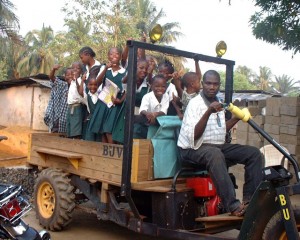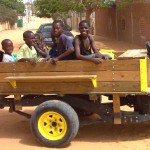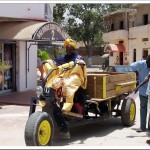Mobility is a basic need in the free market system, especially where resources and roads are scarce. In places like the African bush, quality of life depends upon affordable transportation. In rural villages throughout the developing world, there are people who have never considered the concept of faster transportation. Women and children walk miles to retrieve water, medical clinics rely on man-powered carts or patients traveling by foot, and food cultivation is slowed without the power of a farming vehicle.
Imagine walking a mile to get water, three times a day, carrying an 80 pound jug on your head, or a small child carrying a 20 pound bucket.
Imagine transporting a sick family member to a doctor 20 miles away, three of you on one motorcycle — 1 to drive, 1 sick person, and 1 person to hold on to the driver to hold the patient upright.
Imagine transporting your food to the market five miles away, only to find that no one needed it, or there was an overabundance of your crop that day.
Imagine walking three miles to school in 100+ degree heat, every day.
Beyond comfort and efficiency, transportation truly has the power to transform lives.
- A child whose morning routine included a 3-mile round-trip walk to get water for her family, could be relived of her duty and sent to school instead.
- A pregnancy complication could be treated in time through the use of an affordable clinic vehicle.
- Goods could be easily brought to market, just as students could have a safe ride to school.


